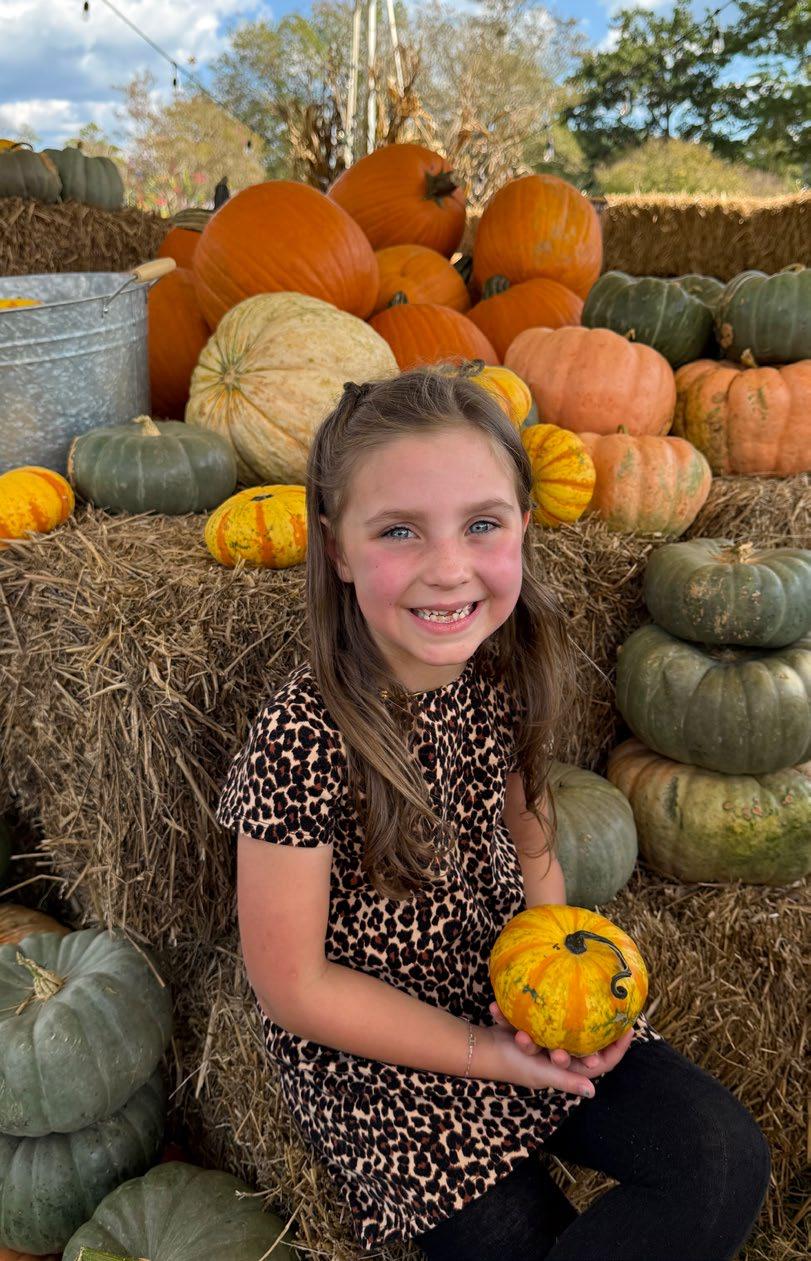








By Linda Ligon, Family & Kids
If you have a middle school student, you are probably feeling the ‘peer pressure’ to provide your child with a cell phone. According to a study performed by Common Sense Media, a nonprofit organization that helps parents make informed decisions about kids’ digital technology use, 42% of kids have a phone by age 10. Your child may tell you she feels left out because all her friends have one and she does not. If your child is requesting a phone as a holiday gift, here is what to consider first.
When you purchase a cell phone for your child, you entrust her with an expensive item that can be damaged if not cared for properly. Is your child ready for this type of responsibility? If your child tends to misplace items, she may not be ready for a phone. Also, if your child likes to game, does she understand that she needs to ask before spending money on gaming or know how to stay within the gaming budget you provide? This may become an issue if she does not.
Do you already have trouble limiting your child’s screen time? If your child is already unable to self-regulate screen time and you are constantly having to step in to interrupt gaming, it is likely a smart phone will just aggravate this issue. While you continue to work on helping your child self-regulate her screen time, it may be wise to avoid giving her a smart phone. If you need her to have a phone for communication purposes, consider a non-smart phone that will only make calls and send texts.
Does your child have the maturity to understand that when she sends a text or posts something on social media, it is out
in cyberspace for good and cannot be taken back? If your child is impulsive, she may not be ready for the responsibility of a phone. Unfortunately, inappropriate posts can resurface years later when your child is applying for a job or a scholarship and a background check is performed. Also, if your child already gets into arguments on online chats, she may not be ready for a cell phone.
Does your child have knowledge of how to stay safe online and know how to handle phishing texts and chats? Your child must be able to recognize when she is being ‘phished’ and know not to provide personal information.
Many parenting experts do not feel that kids should be given a phone until about 8th grade or later. Use your best parenting judgment, not peer pressure, to decide if your child is ready, and stand firm if you do not think she is. If you decide that she is not yet ready, talk with your child about it and create a plan together that helps her build the maturity and social skills you require of her before she can get a phone. While your child is working towards her goal of getting a phone, help her find other ways to stay connected with her peers, such as playing sports or after-school activities.
If you decide that your child is ready for a phone, allow her to use a phone on a trial basis first. Use parental controls to filter content, limit screen time and to restrict which apps are on the phone. Let her know that as she demonstrates good cell phone habits, you may consider giving her a little more independence and may be willing to consider new apps. Model good digital technology practices, such as no phone use at the table.





The Columbus Ballet proudly announces its 29th presentation of The Nutcracker, a timeless holiday classic filled with dazzling artistry and community collaboration. The performances will take place at the RiverCenter for the Performing Arts on Saturday, December 13 at 7:30 PM and Sunday, December 14 at 2:30 PM.
Beloved by generations, The Nutcracker has become one of Columbus’s most cherished holiday traditions, uniting families, friends, and art lovers for a magical celebration that welcomes the season with wonder and joy. For many local families, attending the ballet marks the official beginning of the holidays—a chance to share in a story that transcends time and age.
Based on the tale by E.T.A. Hoffmann and set to Tchaikovsky’s unforgettable score, The Nutcracker follows young Clara, who receives a wooden nutcracker as a Christmas gift. When the clock strikes midnight, magic fills the air—her nutcracker comes to life, leading Clara into a world of wonder. Together, they battle the fearsome Mouse King, journey through a sparkling snow-covered forest, and arrive at the enchanting Land of Sweets, where the Sugar Plum Fairy reigns.

The ballet’s blend of fantasy, bravery, and childhood dreams continues to inspire awe in audiences around the world.
This year’s production promises to captivate audiences with breathtaking costumes, enchanting sets, and technically stunning performances. What sets this Nutcracker apart is its exceptional live orchestra accompaniment, featuring singers from the acclaimed Voices of the Valley choir—a rare treat in local productions. Under the baton of distinguished conductor Paul Hostetter, the orchestra includes esteemed faculty and gifted students from the Schwob School of Music, adding richness and depth to every note.
“This year’s Nutcracker promises not only to uphold the cherished legacy of The Columbus Ballet but also to bring new life and imagination to a story that generations of families have enjoyed together,” says guest artistic director Ben Redding.
Tickets are available at rivercenter.org or by calling the RiverCenter Box Office at 706-256-3612. Don’t miss your chance to experience the magic!
By Linda Ligon, Family & Kids
Mental math, the ability to perform mathematical calculations without the use of calculator, pen or paper, is a valuable life skill. Being able to perform mental math gives someone the ability to quickly calculate a tip or calculate a per unit price when shopping for a bargain. For students, this mathematical intuition can help them gain an understanding of the relationships between numbers and lay a strong foundation for more complicated math concepts. Mental math is also excellent exercise for the brain and can help improve critical thinking and problem-solving skills.
Start with the basics. To successfully perform mental math, a student first strengthens his knowledge of basic math facts, such as knowing that 3+ 5 = 8 and 8 – 3 = 5. Knowing basic math facts, including those for addition, multiplication, subtraction and division for numbers 1 – 12, helps your child understand the relationship between numbers.
Students learning more advanced math concepts benefit from using mental math to turn equations such as 3x = 12 into words that then help them perform the equation without a calculator or pen and paper. For example, to solve this equation, the student mentally uses algebra concepts to turn the equation into ‘What is 12 divided by 3?” and then uses his knowledge of math facts to quickly solve the equation.
Divide math processes into smaller pieces. When asked to perform equations involving larger numbers, one mental math strategy is to break the numbers down into smaller, more manageable pieces. For example, if your child is asked to add 57 + 22, he could first break 57 into 50 + 7 and 22 into 20 +2, then add 50 + 20 and 7 + 2 and add them together. 70 + 9 = 79.
An alternative strategy would be to round up numbers to multiple of ten and then subtract the amount needed for a correction. For example, 27 + 38 would be broken down into 30 + 40 = 70 – 5 = 65. Breaking math problems down into smaller pieces that are easier to mentally manipulate works for multiplication and division also. For example, to find 72 x 12 you could break it down into 70 x 10 = 700, 2x12 = 24 and then, 700+24 = 724.
Make mental math easier by grouping by 10s, 50s, 100s, 1000s, etc. Grouping helps with estimation and helps you handle larger numbers quickly. You can do this by shifting a value from one number to another, such as 38 + 52 becoming (38 + 2) + (52-2) = 40 + 50 = 90. This skill can make it easier to check your work and spot mistakes.
+ Practice mental math skills daily and keep the practice to about 5 or 10 minutes per session. Your child may feel overwhelmed if you try to pack too much into one session.
+ Mix in some fun games, such as math bingo (you call out a math problem, your child covers the answer on the card) with various types of practice problems.
+ Teach the techniques of mental math step by step and ask your child to explore different ways he can solve a problem. Ask him to compare the different techniques to see which one is the best for solving the problem.
+ Bring mental math techniques to life for your child by having fun with real world examples, such as following a cookie recipe or estimating if he can buy the new toy he wants with his allowance.

I provide my clients with physical, emotional, informational, and even spiritual support. I advocate for my clients to ensure they are centered in their care. I assist clients in empowering themselves through education and increased self-confidence. All are welcome, especially teens and young adults navigating the beginning stages of parenthood.
Monday - Friday: 8am - 4pm
Saturdays: by appointment
Sundays: Closed

By Jessica Asani, Full Spectrum Support Specialist at Jendayi, Columbus, Georgia
The World Health Organization defines the maternal mortality rate (MMR) as the number of maternal deaths—those occurring during pregnancy, childbirth, or within 42 days of the end of pregnancy—per 100,000 live births. In Georgia, the now-disbanded Maternal Mortality Review Committee expanded that timeline to include deaths up to one year postpartum.
According to the state’s 2020–2022 report, Georgia’s MMR stands at 37.9%, with an alarming 87% of those deaths deemed preventable. The leading causes include cardiovascular complications, COVID-19, mental health conditions, hemorrhage, and embolism.
Research consistently shows that educated, middle-class birthing individuals experience fewer complications. These improved outcomes, however, can also be achieved for working-class families when they have access to trained support specialists, commonly known as doulas.
A support specialist is a non-medical professional who offers emotional, physical, informational, and advocacy-based support during pivotal life transitions—such as fertility, adoption, birth, postpartum recovery, and even bereavement. In the context of childbirth, doulas play a key role in bridging the gap between medical care and emotional well-being.
The benefits of having a support specialist are well-documented:
• Lower rates of premature labor and cesarean sections
• Reduced need for epidurals and other medical interventions
• Improved birth weights and overall maternal health
• Decreased rates of postpartum depression and anxiety, especially for those without strong support systems
Support specialists also positively influence long-term outcomes, including:
• Higher rates of body-feeding (breastfeeding or chest-feeding)
• Greater satisfaction with the birth experience
• Improved education around newborn care and safety
The presence of a doula or support specialist can make birth not only safer—but more empowering.
To connect with a qualified full-spectrum support provider, contact Jendayi at Jendayi.fsd@gmail.com, 706-366-9753, or visit www.thejendayidoula.com.
Resources: Georgia Department of Public Health – Maternal Mortality







If you’re looking for a simple way to “fall-itize” your table this season, these leaf stamped napkins are for you, and easy enough to do with the kids. Plus they would make great hostess gifts.

To start, forage for leaves throughout your yard or neighborhood. Grab a variety of styles and sizes – you never know what you’re going to like best! Choose a leaf and turn it over so the more veiny side is facing up. Dot craft paint on each leaf. I wanted to go with brown paint for this project but decided a little sparkle wouldn’t hurt, so I opted for a metallic brown paint. Brush paint across back of the leaf using a brush. Turn leaf over and carefully position it on your cloth napkin however you’d like it. Lay a paper towel over the leaf. This will ensure your rolling pin doesn’t get paint on it which could transfer to other spots on your napkin. Firmly roll over your leaf, transferring the paint to your napkin. Gently lift leaf from napkin – and you’re done! Practice on an old cloth napkin prior to trying this stamping technique on your final napkins. This will allow you to test out a variety of leaves to see how they transfer, as well as get a good idea of how much paint to apply for the look you’re going for. I opted to use this leaf-stamping technique on napkins, but it would also look beautiful on a runner, tablecloth, tote bags, gift wrapping paper and so much more.
• Leaves
• Napkins
• Craft Paint
• Paintbrush
• Rolling Pin
• Paper Towel




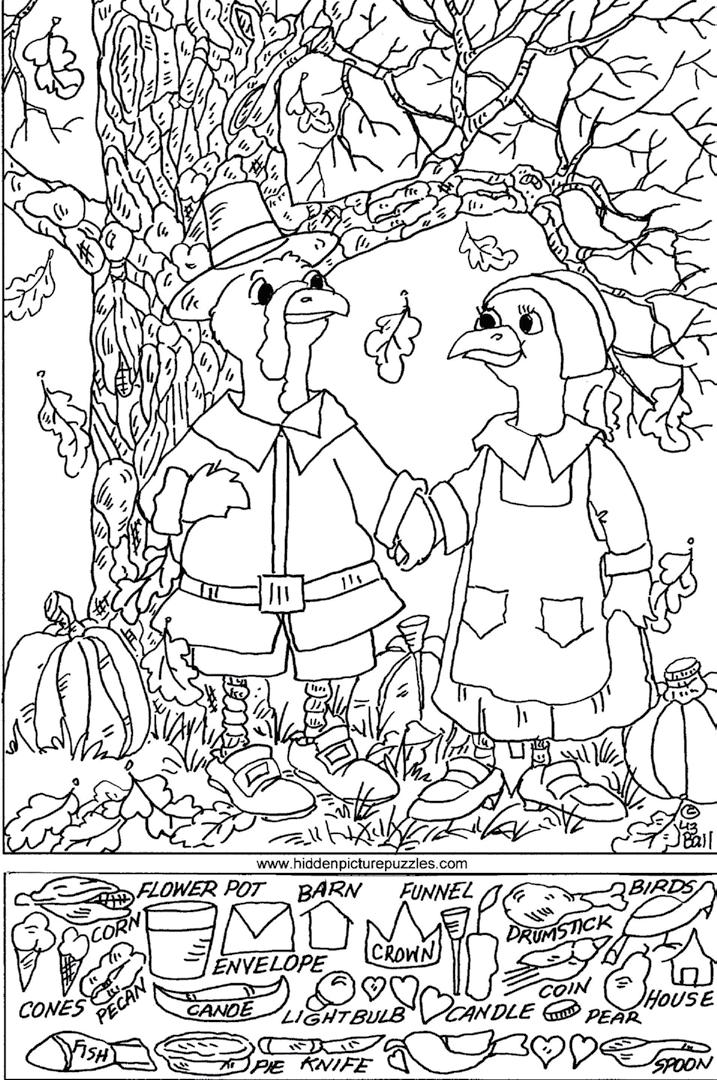
The decomposition of a pumpkin can be a fascinating and educational process for kids to observe and learn about biology and environmental science. It’s a hands-on way for kids to learn about the cycle of life and the importance of decomposition in nature. Remember to carefully handle decomposing pumpkins, as they can become messy and attract unwanted pests.
EXPERIMENT:
1. Carve the pumpkin.
2. Put your pumpkin on display and observe any changes every day until fully decomposed and ready for compost. Note if you see mold growing, if he is softening, flattening and or smelling.
Here’s a simplified explanation of what happens during the decomposition of a pumpkin:
Initial Stage: It decomposes when a pumpkin is carved or left out in the open. Microorganisms like bacteria, fungi, and enzymes break down the pumpkin’s organic matter.
Softening: The pumpkin’s skin and flesh begin to soften as these microorganisms and enzymes break down the complex carbohydrates and proteins within the pumpkin. This is often the first visible change kids might notice.
Color Changes: As the pumpkin decomposes, its color may change. It might turn darker or develop mold in different colors like green, white, or black. Kids can observe and document these color changes.
Odor: One of the most noticeable aspects of decomposition is the odor. Decomposing pumpkins release gases that create a distinctive smell, often described as unpleasant. This can be exciting for kids to explore, although they might want to do it from a distance!
Mold Growth: Mold spores in the environment grow on the pumpkin’s surface as it decomposes. Kids can observe the different types of mold that might appear and how they spread across the pumpkin.
Insects: Insects like flies and ants are attracted to decomposing organic matter. Kids can watch as these insects visit the pumpkin to feed on it and lay eggs. This can provide an opportunity to learn about the role of insects in decomposition.
Soil Enrichment: The pumpkin breaks down further over time, and its nutrients are returned to the soil. This is an important part of the natural decomposition process, and kids can learn about how decomposition contributes to soil enrichment.

• The Book: Pumpkin Jack by Will Hubbell
• A carved Jack O’Lantern pumpkin
• Magnifying Glass
• Tray
• Disposable Gloves {for after he starts to rot}


military families, let's Celebrate!
By Francy Arvizu Family Advocacy Program Fort Benning






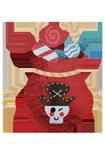
By Janet Yates Vogt & Mark Friedman
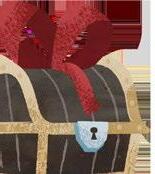



columbusstate.edu/theatre/productions.php
Every November, the nation comes together to celebrate Military Family Appreciation Month, a time dedicated to honoring the unwavering strength, resilience, and sacrifice of the families who stand behind America’s service members.
Military life is not only a commitment made by the service member, but by the entire family. Spouses navigate long separations, unpredictable moves, and the daily responsibilities of home life, often without the immediate presence of their partner. Children adapt to new schools, say frequent goodbyes and cope with the emotional weight of having a parent deployed.
These families form the emotional foundation that keeps our armed forces strong. Their stability and love help service members focus on their mission, knowing that home is being held together with dedication and care.
The Family Advocacy Program assists Soldiers and their Families in addressing the unique challenges that come with Military life. They offer a range of services such as seminars, workshops, counseling, and interventions
to strengthen Army Families, enhance resilience, relationships skills, and enhance their quality of life. Focused on issues like domestic abuse, child abuse, and neglect, the program emphasizes prevention, education, reporting, investigation, intervention and treatment.
Join FAP on these upcoming events: Painting with a Twist Nov. 6, 530-7pm, Infantry Bar (# 2784)
A guided couples painting experience for a date-night that encourages connection and reflection.
Family Game Night To -Go November, Mon-Fri from 9am-3pm
Show us what you love about your Military Family! Bring a drawing, story, or a poem about your Family to FAP Building 36, 7131 Richardson Circle and receive 2 free board games to enjoy a Family Game Night at home, while supplies last.
For more info on supporting Military Families, contact the Family Advocacy Program at 706-544-7233 (SAFE) or visit 7131 Richardson Circle, Building 36, Fort Benning.
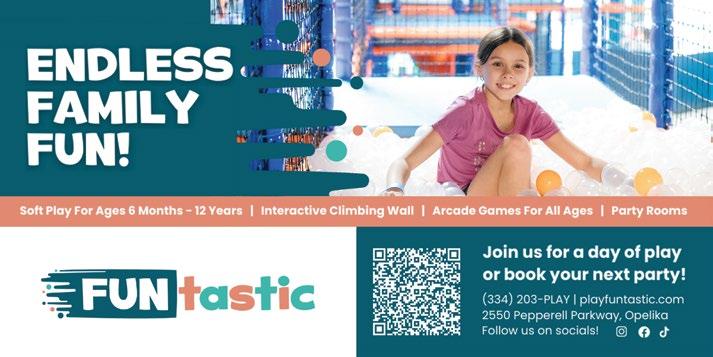
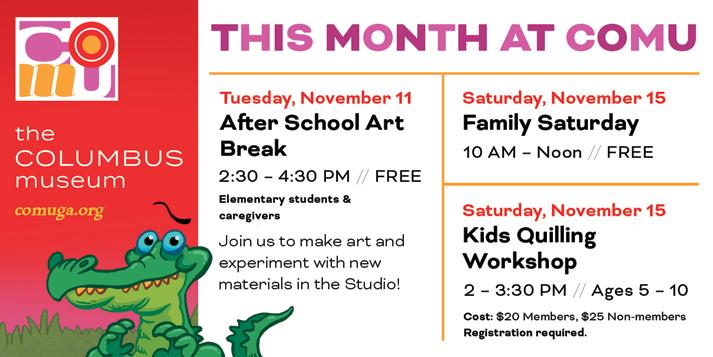

This no butter healthy apple crisp uses syrup instead of sugar and coconut oil instead of butter, but has all the rich flavors and gooey textures as the classic. It's easy to make and the perfect fall dessert
1. Preheat oven to 400°F and cream a 2 quart baking dish with nonstick spray and set aside.
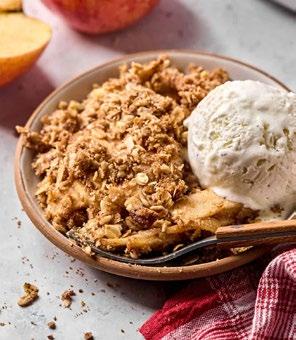
2. In a large bowl, mix together the apples, maple syrup, flour, cinnamon, nutmeg, vanilla, sea salt and lemon juice. Dump apples into the prepared baking dish and set aside.
3. In a medium bowl, mix together the almond flour, old -fashioned gluten free oats, coconut sugar, pecans, cinnamon and salt. Add the cold coconut oil and cut it into the dry ingredients with the back of a knife or a pastry blender. Spoon the crisp topping evenly over the apple mixture, there will be a lot. Bake in the preheated oven for 35-40 minutes. Begin checking the crisp at 35 minutes to avoid over-browning. Allow to cool slightly and serve warm.
As the air turns crisp and the leaves begin their fiery transformation, nothing embodies fall quite like the humble apple. Whether plucked fresh from the orchard or gathered from a local farmers’ market, apples bring sweetness, crunch, and a touch of nostalgia to the season. But beyond their cozy charm, these ruby, golden, and green gems pack a powerful punch of nutrition and history.
Apples are rich in fiber, vitamin C, and antioxidants— making them a smart, satisfying choice for kids’ lunchboxes and after-school snacks. Studies show they can help support heart health, aid digestion, and even improve energy levels, offering a wholesome alternative to processed sweets. With over 7,500 apple varieties grown worldwide, there’s an apple to suit every taste, from tart Granny Smiths to honey-sweet Fujis.
Fun fact: apples have been cherished for thousands of years. Ancient Romans cultivated them, and early
• 7 cups baking apples peeled and very thinly sliced (4 medium or 3 very large apples)
• 1/4 cup pure maple syrup or brown sugar
• 1/4 cup all-purpose flour or 1:1 gluten-free flour (2 tbsp tapioca flour works)
• 1 teaspoon cinnamon
• 1/8 teaspoon nutmeg
• 1 teaspoon vanilla
• ½ teaspoon sea salt
• 1 tablespoon lemon juice
CRUMBLE TOPPING
• ½ cup almond flour
• 1 1/2 cups old-fashioned rolled oats
• 1/3 cup coconut sugar
• 1/2 cup chopped pecans
• 1 teaspoon cinnamon
• 3/4 teaspoon salt
• 1/4 cup coconut oil or vegan butter chilled
Courtesy of: www.whatmollymade.com
American colonists brought their favorite seeds across the Atlantic. Even Johnny Appleseed—real name John Chapman—played a key role in spreading apple orchards across the Midwest in the 1800s, ensuring the fruit would remain a symbol of home and harvest.
This season, celebrate the apple’s long legacy by turning your bounty into a Healthier Apple Crisp—a comforting dessert that swaps heavy sugars and butter for oats, nuts, and a drizzle of honey or maple syrup. The result is a warm, fragrant treat that feels indulgent but nourishes the body, too. Serve it with a dollop of Greek yogurt or a scoop of vanilla oat ice cream for the perfect fall finish.
From lunchbox slices to family desserts, apples remind us that simple, natural foods often bring the most joy—and that every bite can be both delicious and good for you.
1 Smiths Station Holiday Bazaar. 9am-2pm. Smiths Station City Hall; smithsstational.gov
1 Little Naturalists (preschoolers). 9:30am. $5/child. Oxbow Meadows; 706-507-8550
1 Artful Babies. 10:30am. Columbus Museum; 706748-2562 ext 6520
1 Bird Olympics. 11am. $3/child. Oxbow Meadows; 706-507-8550
1 Radical Reptiles Show. 1:30pm. $5/child. Oxbow Meadows; 706-507-8550
1 Nature Nook Storytime. 3:30pm. Oxbow Meadows; 706-507-8550
1 Free Astronomy Night. 7pm. Coca-Cola Space Science Center; visitcolumbusga.com
1 - 2 Fall Bark in the Park. 11am. $10/dog plus $5 parking. Providence Canyon State Park, Lumpkin; 229-838-6202
1 -2 Christmas Made in the South. Times vary. Columbus Trade Center; 706-327-4522
1 - 9 2025 National Peanut Festival. Dothan, AL; 334-793-4323
1 - 2 1 Uptown’s Scarecrow Trail. 11am. Uptown Columbus; visitcolumbusga.com
3 Ada Twist, Scientist & Friends. 11:30am. $18. Grades K-4. RiverCenter; 706-323-5059
3 Teen Movie Mondays. Teen. 4pm. South Columbus Library; 706-683-8805
3 Teen Movie Mondays: No Good November: The Hunger Games: The Ballad of Songbirds & Snakes (PG-13). 4:30pm. Columbus Library; 706-243-2811
3 Juice & Jams: Children’s Book Sale. Families. 10am-12noon. Columbus Library; 706-243-2813
4 Edible Engineering. Ages 6-11. 3pm. South Columbus Library; 706-683-8805
4 Kid’s Art Studio. Ages 5-12. 4pm. Columbus Library; 706-243-2813
4 Teen Takeover: Anime Club. 4:30pm. Columbus Library; 706-243-2811
4 Little Sprouts. 10am. $5. Columbus Botanical Garden; 706-327-8400
4 Artful Babies. 10:30am. Columbus Museum; 706748-2562 ext 6520
4 Science of Shared Space: Music Under the Dome Series. 5pm. $10. Coca-Cola Space Science Center; 706-649-1486
4 MAMA B.E.A.R.S. Breastfeeding Support meeting (Part 2). 12:30pm. Columbus Pediatric Assoc; 706221-4602
5-6 The Snow Queen. 7:30pm. $5-$18.50. Family Theatre; 706-315-6202
6 Simple Steps: Play. Ages 2-5. 10am. South Columbus Library; 706-683-8805
6 Postpartum Circle: Group Discussion. Families. 11am. Columbus Library; 706-243-2813
7 Side Quest: Mini Adventure. Families. 4pm. Columbus Library; 706-243-2813
7 Teen Takeover: Snack Taste Test. 4:30pm. Columbus Library; 706-243-2811
7-9 The Art of Glass Making: Ornaments & Snowman. Times vary. $65-$75. RSVP. Columbus Museum; 706-748-2562
8 Nature Babies (0-23 months). 9:30am. $5/child. Oxbow Meadows; 706-507-8550
8 Tri-City Veterans Day Parade. 10am. Broadway, Columbus; columbusga.gov/parks
8 Mini Makers. 10:30am. Ages 2-4. RSVP. Columbus Museum; 706-748-2562 ext 6520
8 Gigi's Playhouse (Down Syndrome Achievement Center) Fundraiser Tailgate Party. 11am-2pm. Games, food, raffles; Young Life, 2750 Sowega Dr, Columbus.
8-10 The Leaves are Falling: Theatre for the Very Young. Sat 11am & Sun 2pm. Ages 0-3. Springer Opera House; 706-327-3688
8 Annual Fountain City Classic. Noon. $16-$30. AJ McClung Memorial Stadium; ticketmaster.com
8 Animals and Science! Oh My! 1:30pm. $5/person. Oxbow Meadows; 706-507-8550
8 Nature Nook Storytime. 3:30pm. Oxbow Meadows; 706-507-8550
8 CSO Open Rehearsal. 12:30pm. Free. All ages. RiverCenter; 706-323-5059
8 CSO: Brahms & Mendelssohn. 7:30pm. $28-$55. RiverCenter; 706-323-5059
8 American Sign Language for Kids. Ages 6-11. 11am. North Columbus Library; 706-748-2855
8 Crocheted Holiday Ornament. Ages 12+. RSVP. 4pm. Mildred L. Terry Library; 706-243-2782
9 Columbus Community Orchestra Celebrates Veterans Day. 3pm. St Mark Church; 706-575-5371
10 Family Fun Night: Family Tree. 4pm. Columbus Library; 706-243-2813
10 Teen Movie Mondays: No Good November: Maleficent (PG). 4:30pm. Columbus Library; 706243-2811
11 Mini Makers. 10:30am. Ages 2-4. RSVP. Columbus Museum; 706-748-2562 ext 6520
11 After School Art Break. 2:30-4:30pm. Columbus Museum; 706-748-2562 ext 6520
12 MOPS/MomsNext. First Baptist Church of Columbus; 706-322-4468
12 MAMA B.E.A.R.S.Breastfeeding Support meeting (Part 1). 5:30-7pm. Columbus Pediatric Assoc; 706-221-4602
12-13 The Snow Queen. 7:30pm. $5-$18.50. Family Theatre; 706-315-6202
13 Budding Naturalist. 10am. $7. Columbus Botanical Garden; 706-327-8400
13 Teen Takeover: Crafts. 6pm. North Columbus Library; 706-748-2855
14 Fall Back Into Grannycore: DIY Picture Frames. Families. 4pm. Columbus Library; 706-243-2813
14 The Snow Queen. 2:30pm. $5-$18.50. Family Theatre; 706-315-6202
14-15 River Dragons Hockey Game. Fri 7:30pm, Sat 7:05pm. Columbus Civic Center; 706-653-4460
14-15 Fantasy in Lights: Bicycle Nights. $20-$25. Callaway Gardens; 844-887-6735
15 Steeplechase at Callaway Gardens. All day. 214 Nelson Rd, Pine Mountain; 706-324-6252
15 Folk Tales Theatre. 10am & 2pm. $5/person. Oxbow Meadows; 706-507-8550
15 Family Saturday at the Museum. 10am-Noon. Columbus Museum; 706-748-2562 ext 6520
15 Kids Quilting Workshop. 2-3:30pm. Ages 5-10. $20-$25. Columbus Museum; 706-748-2562
15 Astronomy Night with the Coca-Cola Space Science Center. 6-8pm. $5 parking. Providence Canyon State Park, Lumpkin; 229-838-6202
15 Mercer School of Medicine Teddy Bear Clinic. Families. 10:30am. South Columbus Library; 706683-8805
15 Family Arts Outreach Day. Columbus Museum. 10am-Noon. Create, play and listen to instruments with CSU's Music Dept to put on your own Macy's Thanksgiving Day Parade. 10am-Noon. Columbus Museum; 706-748-2562 ext 6520
15 French 101 for Kids. Ages 6-11. 11am. North Columbus Library; 706-748-2855
15-16 The Leaves are Falling: Theatre for the Very Young. Sat 11am & Sun 2pm. Ages 0-3. Springer Opera House; 706-327-3688
15-16 American Frontier Days. Sat 9am-5pm, Sun 9am-3pm. $5 parking. F. D. Roosevelt State Park; 706-663-4858
16 Fantasy in Lights: Harris Co Appreciation Night. 6-9:30pm. $15. Callaway Gardens; 844-887-6735
17 The Snow Queen. 2:30pm. $5-$18.50. Family Theatre; 706-315-6202
17 Teen Movie Mondays: No Good November: Cruella (PG-13). 4:30pm. Columbus Library; 706243-2811
17-30 Fantasy in Lights. 6-8:30pm. Callaway Gardens; 844-887-6735
18 Crafty Kids: Criss Cross Yarn Critters with the Pastoral Institute. Ages 6-11. 3pm. South Columbus Library; 706-683-8805
18 Kid’s Art Studio. Ages 5-12. 4pm. Columbus Library; 706-243-2813
18 Teen Crafternoon: Lo-Fi Fiber Arts. 4:30pm. Columbus Library; 706-243-2811
18 Teen Takeover: Thankful Theatre Games. 4:30pm. South Columbus Library; 706-683-8805
19 MAMA B.E.A.R.S. Breastfeeding Support meeting (Part 2). 12:30pm. Columbus Pediatric Assoc; 706-221-4602
20 Edible Engineering: Edible Erosion. Ages 6-11. 3pm. North Columbus Library; 706-748-2855
20 Teen Takeover: Wicked Sing-Along (PG). 4:30pm. Columbus Library; 706-243-2811
20 Tabletop Games for Teens. 6pm. North Columbus Library; 706-748-2855
21 Candlelight in Warm Springs. 6:30-9pm. Warm Springs; 706-975-0622
21-22 River Dragons Hockey Game. Fri 7:30pm, Sat 7:05pm. Columbus Civic Center; 706-653-4460
22 Folk Fair Saturdays. 10am-6pm. Rose Hill Heights Park; 706-330-7806
22 Anime Club: Anime Makerspace. Teen. 3pm. North Columbus Library; 706-748-2855
25 Pony Bead Party. Ages 5-12. 4pm. Columbus Library; 706-243-2813
25 Teen Takeover: Get Your Game On: Stranger Things Trivia. 4:30pm. Columbus Library; 706-2432811
25 Upcycling & Giving Thanks. Families. 6pm. Mildred L. Terry Library; 706-243-2782
26 Seedling Storytime. 10-11am. $7. Columbus Botanical Garden, 706-327-8400
29 Holly Jolly Market/ Small Business Saturday. Uptown Columbus; 706-596-0111
29 Outdoor Market. 11am-4pm. Bluebelle Local Mercantile; 706-327-1181
29-30 Frozen: The Broadway Musical. Sat 7pm & Sun 2pm. $30-$85. Springer Opera House; 706-327-3688
MONDAY
Simple Steps Storytime: Babies & Toddlers. Ages 0-36mo. 10am. Columbus Library; 706-243-2813
TUESDAY
Simple Steps Storytime. Babies & Toddlers. Ages 0-24 mo. 10am; Preschoolers. Ages 3-5. 11am. North Columbus Library; 706-748-2855. (Not 11/11 or 11/25)
Get On Board With Board Games: Chess & More. Families. 4:30pm. Mildred L. Terry Library; 706243-2782 (Not 11/11)
WEDNESDAY
Simple Steps Storytime. Ages 0-5. 11am. Mildred L. Terry Library; 706-243-2782
Discovery Hub. Ages 3-5. 11am. Columbus Library; 706-243-2813
THURSDAY
Simple Steps Storytime: Family. Ages 0-5. 10am. Columbus Library; 706-243-2813 (Not 11/ 27)
Simple Steps Storytime: Family. Ages 0-5. 10am. South Columbus Library; 706-683-8805 (Not 11/6 or 11/27)
Sight Word Support. K-3. 3-5pm. Mildred L. Terry Library; 706-243-2782 (Not 11/27)
LEGOS® in the Library. Families. 3pm. Columbus Library; 706-243-2813 (Not 11/27)
Toddler Tales. 10am. Barnes & Noble, 5555 Whittlesey Blvd; 706-653-7880
FRIDAY
Simple Steps Storytime: Rhythm & Rhyme. Ages 0-5. 10am. Columbus Library; 706-243-2813 (Not 11/28)
Fun Fridays. Ages 5-12. 2pm. North Columbus Library; 706-748-2855 (Not 11/28)
SATURDAY
Market Days on Broadway. 9am-Noon. Uptown Columbus; uptowncolumbusga.com
Nature Play. 10am-Noon. Oxbow Meadows; 706507-8550 (Not 11/27)

Storytime with Grammy Trish. 11am. Columbus Bound Bookshop; visitcolumbusga.com
Kids’ Corner. 4pm. Columbus Library; 706-2432813
Drop off your letter to Santa in the magic mailbox at the North Columbus Library between Nov 24- Dec 12, and Mr. Claus will send back a personalized reply! Pick up your reply mail December 16-20. (Don’t forget to include your name, age, and telephone number!)

Als the leaves turn and the air grows crisp, there’s no better time to curl up with a good book—and Chattahoochee Valley Libraries is here to make it easy and fun for the whole family. Families can request Book Bundles online or in person! Just share your child’s age, reading level, and favorite themes, and our librarians will handpick a bundle of engaging stories perfect for fall reading.
The Library offers more than just books. Our digital resources bring learning to life. ABCmouse.com Early Learning Academy (in-library only) features over 3,500 interactive books, puzzles, and educational games for kids. For older students, Brainfuse provides live tutoring, writing support, FAFSA guidance, practice quizzes, a foreign language lab, and more.
Adults, too, have a cozy corner at the Library. The In My Romance Era Book Club meets monthly at the Columbus Public Library, offering busy caregivers a chance to connect over romance and romantasy reads while little ones play nearby.
by Pam Burgamy • Cusseta-Chattahoochee Public Library
November Highlights at Chattahoochee Valley Library Branches:
l Pumpkin Painting Party @ Cusseta-Chattahoochee Public Library
l Edible Engineering @ South Columbus Public Library
l Children’s Book Sale with Juice & Jams @ Columbus Public Library
l Letters to Santa @ North Columbus Public Library (drop off November 24–December 12 for a magical reply)
l Storytimes Galore @ All Branch Locations
This November, let the Library be your family’s place for learning, laughter, and autumn magic. Find dates, times, and branch locations for all events at cvlga.org.
fall in Columbus is a beautiful time to get outside with the family. From easy stroller-friendly paths to more adventurous hikes, there are plenty of spots to enjoy the colors of the season. Below you’ll find some of the top area locations for fall foliage, with highlights on stroller-friendly, difficulty-level and entrance fees. Peak leaf season usually runs from late October through early to mid-November. You can monitor Georgia’s Leaf Watch through state park websites. Mornings and late afternoons often cast more flattering light and overcast days make colors pop. Bring comfortable walking shoes, layers, water, snacks, a camera, possibly a picnic blanket or folding chairs, and a good attitude!
Families can choose from several paved and unpaved nature trails that wind around lakes, through forested areas, and among gardens filled with native trees. Most paths are easy to moderate and suitable for all ages, though some longer trails can be more challenging with a stroller. Admission is required, but the ticket includes access to all of their scenic trails, gardens, and seasonal activities.
Just a short drive from Columbus, Chewacla State Park features a mix of gentle walking trails and more rugged terrain around its scenic lake and waterfalls. Some routes, like the Sweet Shrub Trail, are more manageable with a stroller, while others are better suited for hiking with older kids. The park charges a small entrance fee, but it offers plenty of space for picnicking, playing and exploring nature together.
Located right in the city, these gardens provide a quiet, easy escape into nature without leaving town. The paths are stroller-friendly, winding through shaded wooded areas, although I would suggest a jogger or more rugged stroller. The experience is more of a gentle stroll than a hike, making it perfect for families with young children or grandparents in tow. There is a small admission fee, but the ease and beauty of this spot make it well worth the visit.
This park offers a peaceful retreat with gentle trails, wooded scenery, and a large pond. Enjoy the 1.4-mile loop trail, which provides a good balance of nature and accessibility. The trail is not stroller-friendly. The walk itself is easy, making it ideal for young kids or a laid-back weekend outing. There’s no entry or parking fee, making this a budget-friendly option.
This multiuse trail stretches through Columbus, providing a paved, mostly flat route for walking, biking, and stroller use. Families can hop on at different access points and enjoy miles of shaded trail lined with colorful trees. With no entry fee and plenty of open space, it’s an easy way to enjoy fall close to home.
Georgia’s largest state park offers stunning mountain views, rolling hills, and miles of hiking trails. While some trails are steep or rocky, there are also easier routes that work well for families who want to take it slow. A few sections are suitable for strollers, but most of the park is best explored on foot with sturdy shoes. There’s a small fee, and amenities such as restrooms, picnic areas, and playgrounds make it a great all-day outing. Use the Library's free park pass program at: http://bit.ly/3WqZ3mX.
This park is a local favorite, known for its mix of open granite outcroppings, wooded trails and small creeks. Families can choose short loops for easy walks or explore the longer wooded paths. Some trails are smooth enough for a sturdy stroller, though others are more natural and uneven. The park is free to visit and has plenty of open space for picnics, making it an easy weekend choice.
This Preserve is an educational and peaceful setting for families who love nature. The trails are well-marked and shaded, winding through forest habitats, meadows, and creeks. While most paths are unpaved, some sections can be navigated with a rugged stroller or baby carrier. The terrain is generally easy to moderate, and visitors are encouraged to leave a small donation to help maintain the preserve.
This paved trail follows a former rail line, offering a smooth, mostly level route that’s perfect for strollers, bikes, and scooters. The scenery along the way shifts from open fields to wooded stretches, providing a relaxed outdoor experience. With no entry fee and easy access points, it’s a great option for families looking for a leisurely fall walk.
For families who love exploring a bit deeper into the woods, these trails offer a mix of shaded forest paths and creekside routes. Most of the trails are natural surfaces, so they’re not ideal for standard strollers, though older kids will enjoy walking or biking the easier loops. The terrain ranges from easy to moderate, depending on the route. There is a small fee to park, and the network’s variety makes it easy to tailor your adventure to your family’s energy level.
The Thread is a beautiful urban trail system connecting neighborhoods, parks, and natural areas. The paved paths make it excellent for strollers, bikes, and scooters, allowing families to enjoy a relaxing walk or ride under the fall canopy. The route is flat and easy, and it's free!










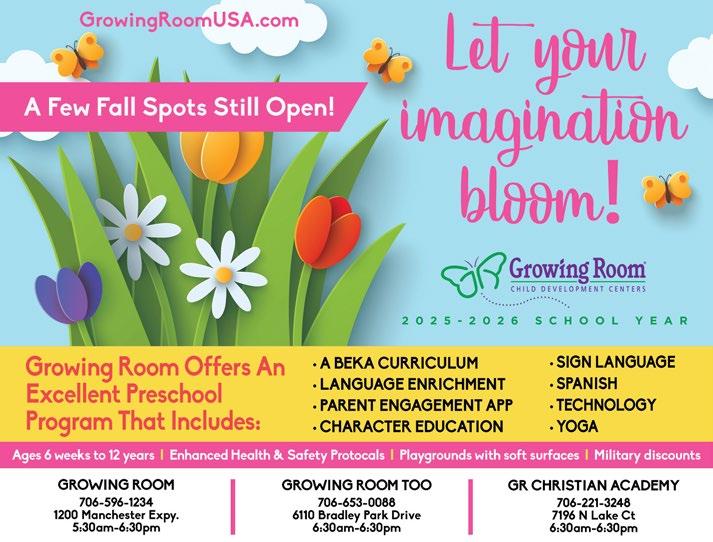

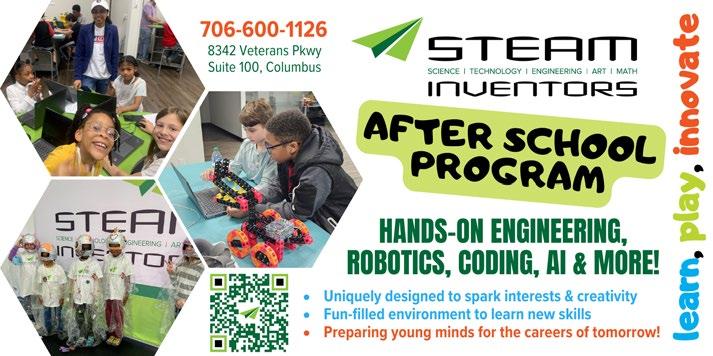
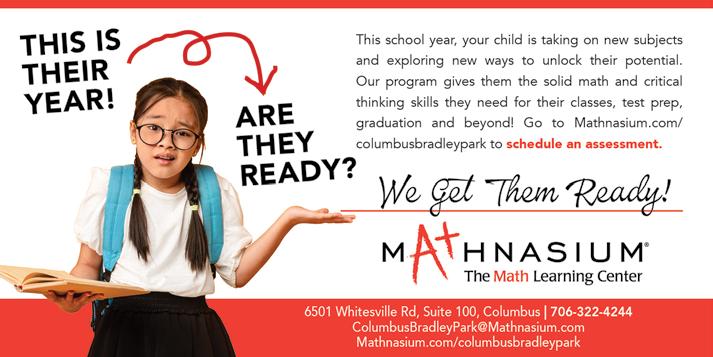



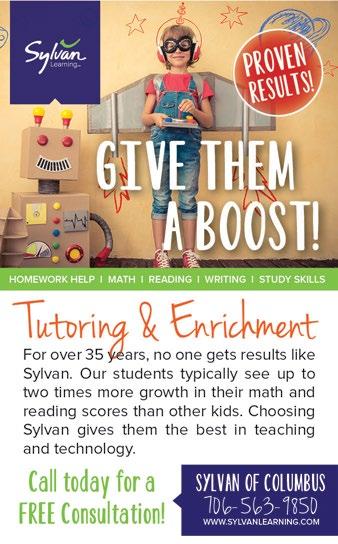
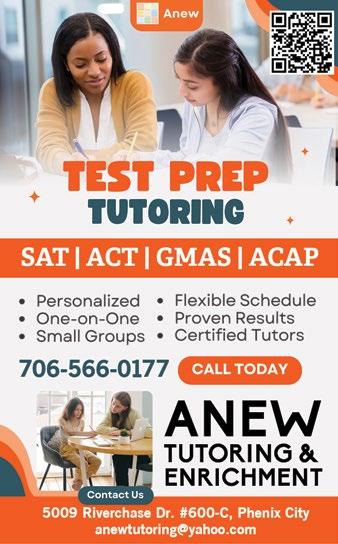
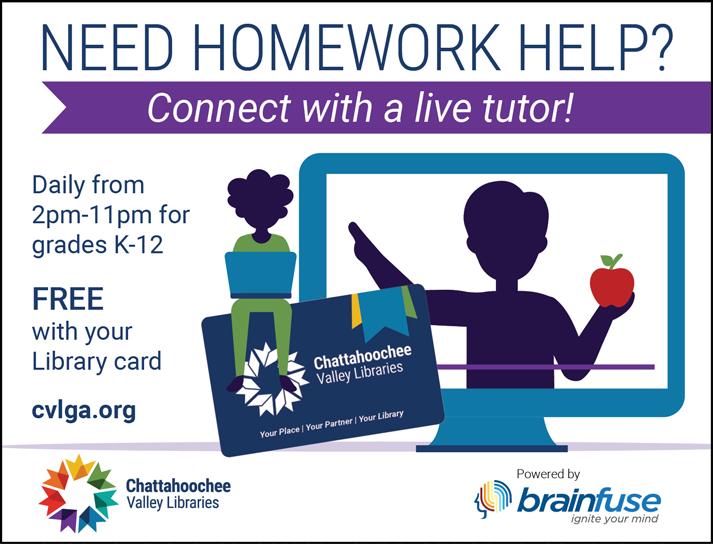





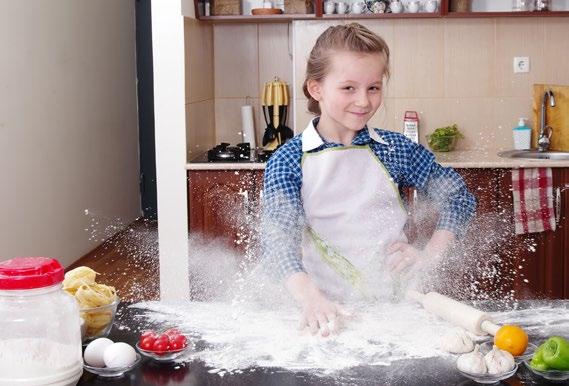
With deals this good, save the mess and dine out!
MONDAY
Sapo’s
5pm until close: free kid's meal with adult entree, dine in only
Tuesday
Chick fil A - Manchester
5-7pm: Free kids meal with purchase of adult meal or salad and drink
Denny’s
4-10pm: Up to two free kids entrées with adult entrée for kids 10 and under
The Food Mill
Make it a family night! Buy a family meal, get 2 kids meals for free!
Ruby Tuesday
5-10pm: Kids 12 and under eat free with adult entrée
wednesDAY
Your Pie
Kid's meals half off with adult entree
thursDAY
Tuesday's Street Tacos & Burritos
Free kids meal with adult purchase; dine-in only
friday
Denny’s
4-10pm: Up to two free kids entrées with adult entrée for kids 10 and under
Ruby Tuesday
5-10pm: Kids 12 and under eat free with adult entrée
multiple days
Bruster’s Ice Cream
Kids under 40” get free baby cone
McAlister’s
Kid’s meals are $2.79 with dine-in order
Smokey Bones
Free kid's meal off kid's menu with adult entrée
Does your restaurant have a special offer for kids?!
Let us know and we can promote it here for free to 20K local parents monthly.
All locations are Columbus, GA unless noted. Specials are subject to change without notice, so please verify them directly before dining. Send kids deals to Tammy@FamilyAndKidsGA.com.
Email it to us at: Tammy@familyandkidsga.com
All locations are Columbus, GA unless noted. Specials are subject to change without notice, so please verify them directly before dining. Send kids deals to Tammy@FamilyAndKidsGA.com.
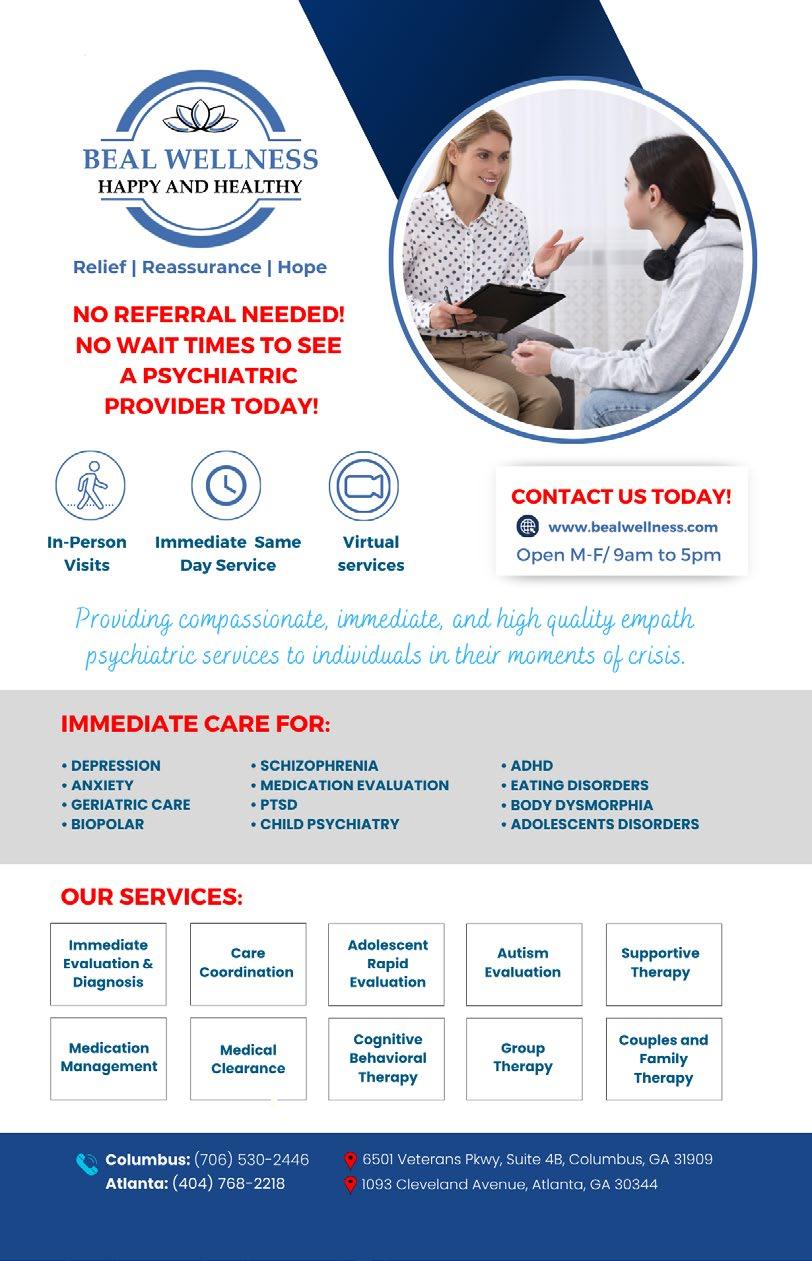

Pulmonary Hypertension is a condition involving high blood pressure in arteries in the lungs and in the right side of the heart. This condition causes the heart to work harder to deliver blood to the lungs. This condition is rare, but it can happen at any age. Premature infants that have a condition called bronchopulmonary dysplasia (underdeveloped lungs) are at risk for developing pulmonary hypertension. Pulmonary hypertension may also occur in children that have congenital heart defects or health issues such as weak heart muscle, Down’s syndrome or cystic fibrosis. If pulmonary hypertension has no obvious cause, it is referred to as idiopathic pulmonary arterial hypertension.
The symptoms of pulmonary hypertension can include: fainting, shortness of breath, abnormal heartbeat, pallor or blue color in the lips, hands and feet, stunted growth and fatigue.
These symptoms are common to other conditions, and it is important to let your child’s pediatrician know about any of these symptoms so that the cause can be correctly identified. To diagnose pulmonary hypertension, your child’s pediatrician may perform an echocardiogram and cardiac catheterization.
By Linda, Ligon, Family & Kids
The ecocardiogram is an ultrasound of the heart that assesses heart function and helps the doctor estimate pulmonary pressure. A cardiac catheterization procedure is used to confirm pulmonary hypertension if the echocardiogram produces abnormal results and can measure the pulmonary blood pressure of the heart.
Premature infants in the NICU are often given nitric oxide, which relaxes blood vessels, thus helping to lower the pulmonary blood pressure. Oral medications that help reduce pulmonary blood pressure and oxygen therapy are commonly prescribed home treatments for infants and children.
Premature infants with pulmonary hypertension often can outgrow the condition as they develop and the lungs grow and heal. However, they need regular follow-up care, as the lungs never completely heal all the way and the condition may reappear later in life. The treatment of infants and children with pulmonary hypertension usually involves a team of medical specialists, such as pediatric pulmonologists and pediatric cardiologists. It is important that pulmonary hypertension is treated early to avoid damage to the heart.
RESOURCE: http://bit.ly/3IZzB4T
By Katherine Maxey, RN, IBCLC, of Birth and Baby Columbus
The most googled breastfeeding question is, “how to breastfeed?” This leaves one wondering how many women are left in the dark when it comes to preparing to feed their baby after birth. The advice and opinions that come at us from all sides are as varied as the options. I think we all want a healthy, happy, fed baby, but equally important is a healthy, happy mom. Can we get both?
One indicator of breastfeeding success lies in prenatal education. Walking into anything prepared is ideal, and learning about feeding your baby human milk is no exception. If you are pregnant and considering your options, attending a breastfeeding education class offered by an expert in human milk feeding is a great way to start.
What about when the baby gets here and things don’t go as planned? Find an IBCLC (International Board-Certified Lactation Consultant) using evidence-based resources and allow them to enter your space and walk with you through the challenges. They should encourage you to trust your instincts, avoid shame-based messaging, and ultimately support you to pick what works for you and your lifestyle.

Some questions that are important for them to ask you: “How do YOU feel about things?”, “What does success look like to you?”, “What is your biggest priority right now?”, and “How is your mental health?” Breastfeeding is a learned skill, and a relationship between two people. It doesn’t have to look one way, usually it doesn’t. It also doesn’t have to be all or nothing. For some, the latch comes easily right away, the milk supply is plentiful, and the bonding just seems effortless. For others, it can be overwhelming, isolating, confusing, and even grief-filled.
There is space and support for all of us. Remember: if you’re struggling, you’re not alone. Help is out there - from support groups and lactation specialists, to pediatricians and online communities. At the end of the day, we just want what’s best for our baby- and spoiler alert: your baby just wants you, fully present, with no room for guilt.
If you need assistance with breastfeeding, or want breastfeeding education, contact Katherine at birthandbabyofcolumbus.com or 706615-4755. Most insurances cover multiple lactation consultations.
By Linda Ligon, Family & Kids
Artificial intelligence (AI) is defined as the simulation of human intelligence in a machine that can learn, reason, and use data and algorithms to solve problems in a manner similar to that of humans. AI has been integrated into our daily lives. Every time you use a search engine, ask your personal assistant on your phone a question or unlock your phone using facial recognition, it is likely you are using software that has embedded AI applications. Also, directly interfacing with AI chatbots such as ChatGPT is quickly becoming more common. These products carry on human-like conversations, simulating a human-like voice and conversation style, and some can also generate new content.
The chatbots learn and adapt from the data provided to them by users and the internet. They are designed to engage the user and to provide replies to questions that feel personal, empathetic and realistic. Asking a chatbot to help research a fact when doing homework seems like a harmless use of AI. However, there are many risks involved when kids use AI, especially the ‘companion’ AI chatbots that simulate human friendships.
Companion Chatbots are not intended for use by kids. While using a chatbot may be helpful for an adult trying to work out a minor everyday issue, using a chatbot can be dangerous for kids.
Due to their vivid imaginations and developing critical thinking skills, kids are less able to discern between the real world and fantasy. The ‘friend’ Chatbots can be so engaging that a child loses sight of what is real and starts to live in a fantasy world powered by the relationship with the friend Chatbot. Your child may become distant from friends and family and also lose sight of how a human relationship should work. He may forget how to show respect or have empathy towards others.
The engaging design of chatbots and their overly validating nature can make them dangerous to kids, especially teens going through an emotional challenge. The chatbot does not understand human emotions or know what is age-appropriate. It is only guided by what it learns online and from other users. The chatbot, when it uses algorithms to create a response based on this data it had ‘learned,’ can sometimes give incorrect and harmful ‘advice’ when a child asks about topics such as violence, suicide, self-harm and sex, potentially leading a child down a dangerous path.
Your child may feel so deeply involved in this friendship with the chatbot that he shares personal information, creating a privacy issue. The data provided to chatbots can be used for AI ‘training” or could be hacked.
Unfortunately, once kids enter the online world, it will be difficult to always monitor their use of AI chatbots, especially since chatbots have become part of some gaming platforms.
First, have a conversation with your child to see how much exposure he has had to chatbot use. In a casual, non-judgmental manner, ask him if he has a favorite chatbot and why it is the most interesting to him.
For young kids, it is best to block access to AI products. If you decide to allow an older child to have access to an AI product, teach your child to question the information it provides. Only allow access to AI products that are intended for kids and have strong filtering and parental controls.
Make yourself available and approachable so that your child knows he can rely on you for emotional support and is less tempted to seek support from a chatbot.

